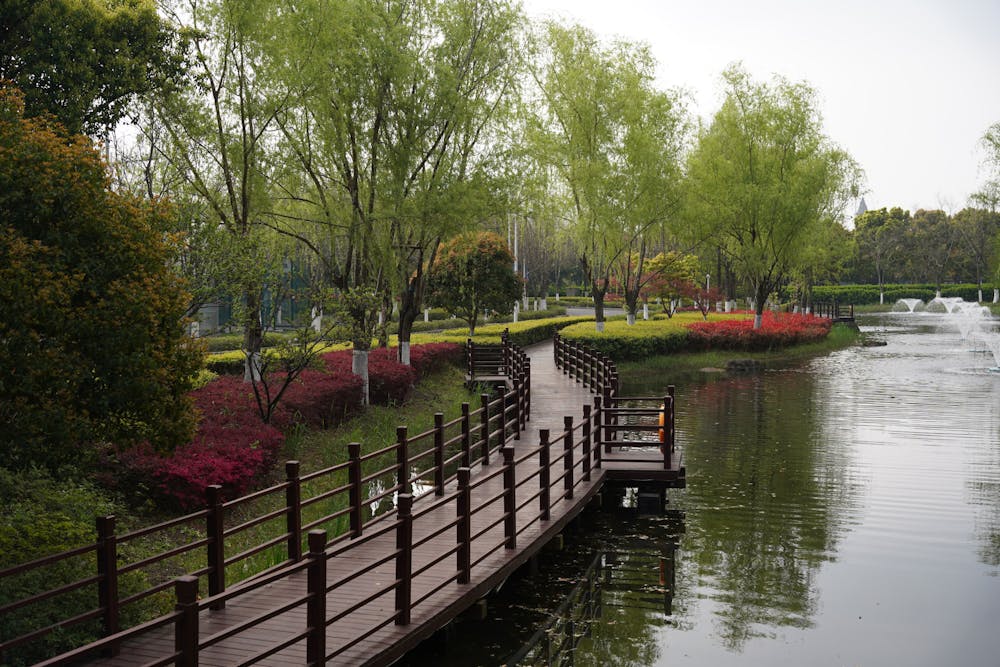Just as Duke students may opt to study abroad throughout their time at Duke, University faculty looking to broaden their global perspective can do so too — by teaching abroad in China at Duke Kunshan University.
Through the DKU faculty exchange, Duke faculty members can spend up to a full academic year teaching undergraduate or graduate courses at the University’s partner campus in Kunshan, Jiangsu, China.
DKU was initially established in 2013 as a joint venture between Duke and Wuhan University. In 2018, the partner university officially opened its doors to undergraduates, with its inaugural Class of 2022 drawing a size of 234 students. Now, the Class of 2028 boasts 490 undergraduates.
For some professors, the prospect of launching a new university and designing a new curriculum was the motivating factor behind their travels to China.
Professor of Physics Ronen Plesser arrived in Kunshan in fall 2016 to teach various astronomy and physics classes before DKU officially welcomed its first undergraduate students. Plesser described his experience as part of a “pioneering group,” watching the partner university lay out its visions of what was to become DKU.
“The concept of launching a brand new university in the 21st century is amazing,” Plesser said. “It's very rare and [in] some sense [an] unrealistic opportunity.”
While some DKU professors hail from Duke, others teach at universities around the world. Many decide to come to Kunshan for one term — a seven-week session as part of DKU’s quarter system — while on sabbatical from their home institution.
Eric Spana, associate professor of the practice of biology who was among the initial cohort of professors at DKU, viewed the experience as a no-cost opportunity to visit China, making it an attractive option for many faculty.
Despite the enticing offer, both seasoned veterans and first-timers shared that the experience has come with a number of challenges — most notably the language barrier. Since classes are taught in English, many DKU students may be learning in a language that is not their first.
“[Communication] becomes a major ingredient of what you're doing, and I can't say that I know how to do it, but I'm figuring out [the] tricks,” Plesser said.
Additionally, DKU operates on an accelerated seven-week schedule rather than a traditional 15-week semester, prompting professors to condense their course material. Plesser noted that students get “half the number of nights to sleep on” the course content compared to their Duke counterparts, despite having the same amount of lecture time.
Even while navigating those challenges, Plesser has found the experience rewarding, pointing to DKU students’ ambition, work ethic and preparedness for the academic rigor.
Beyond the classroom, Plesser and Spana added that they enjoyed connecting with a diverse and tight-knit group of students. Both said that the smaller size of the university, which hosts around 2,000 students and over 200 faculty — fewer than Duke’s roughly 6,500 undergraduate students and 4,200 faculty members — facilitates close interactions between students and faculty.
For Spana, that meant getting lunch with students, where they chatted about post-college plans, current classes and upcoming quizzes, as well as playing Dungeons and Dragons with a small group of undergraduates and professors every Thursday evening. He described their game nights fondly, with plenty of Chinese boba, Domino’s Pizza and a space for everyone at the table.
Plesser discussed taking advantage of the smaller DKU campus to facilitate cross-departmental collaboration, which he noted did not come as easily on Duke’s main campus.
“[At Duke], the average frequency with which I speak to experts in visual arts or philosophy is very low. I tend to stay on Science Drive. At DKU, that's not the situation because of the size,” Plesser said. “During these two months, I talked to more philosophers than I did the rest of the other 10 months [at Duke].”
Outside the campus premises, faculty spending a term at DKU adjust to cultural differences, from ordering food to shopping.
For Spana, every day was an adventure as he adjusted to the language barrier. Not knowing Mandarin himself and being unfamiliar with the Chinese system of WeChat pay, he recounted how routine activities such as walking to the local supermarket or mail-ordering bread from a local bakery were new experiences for him and felt like big accomplishments.
Despite the cultural differences and academic changes, Plesser noted that his commitment to the discipline remains the same.
“It’s still teaching physics. So that’s one of the things that connects,” Plesser said.
Get The Chronicle straight to your inbox
Sign up for our weekly newsletter. Cancel at any time.
Plesser cherished the opportunity to visit and teach at DKU and described the growth of the University with his own eyes. Since the pandemic, he has “been on loan from Duke to DKU” every spring semester.
Spana expressed his desire to return to Kunshan, speaking of how he was accustomed to academic and everyday life in China.
“It took me a long time to get the hang of it, which is why I wanted to go back,” Spana said.
Ella Moore is a Trinity first-year and a staff reporter for the news department.
Claire Chen is a Trinity first-year and a staff reporter for the news department.

